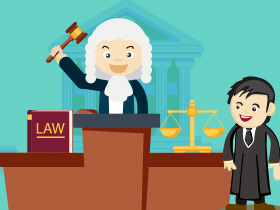Classroom activity: Mock trial
Last Modified: 07/12/2016
Here is a suggested classroom activity for you: a mock trial about drug abuse.
- Tell students that you will have a mock trial.
- Ask what happens at a trial to elicit key vocabulary.
(closing statement, court, defence, defendant, guilty, judge, lawyer, opening statement, verdict, witness)
- Give out the Case Notes. Everyone has 5-10 minutes to read them. Ask questions to make sure they understand the case. For example:
What did Chris Young do from 7.30 to 8.15 on 28 September?
How do Chris and Craig know each other?
Why might Craig try to frame Chris?
- Ask or choose students to take up 9 roles (judge, two defence lawyers, two prosecution lawyers, defendant, three witnesses). The lawyers must give one minute opening or closing speeches to support their case. Give them 10 minutes to prepare.
- The rest of the class should think of questions to ask the witnesses.
- Move seats to have a witness stand at the front of the class. The judge and lawyers should also sit at the front.
- The judge starts the trial by saying, 'Chris Young, you are accused of possessing illegal drugs to sell. How do you plead?' Chris should answer, 'Not guilty, your honour.'
- The judge then calls the three witnesses by saying, 'I now call … to the stand.'
- The class can ask each witness questions for about 6 minutes. The lawyers can ask one question each. You may need to stop the questions being too leading or emotional!
- The judge says, 'I now call Chris Young to the stand.' The class can ask questions for 8 minutes. Lawyers can ask him/her two questions each.
- The lawyers can give one-minute closing statements to remind the class of the main points.
- The class becomes the jury. The judge asks, 'All those who find the defendant guilty/not guilty raise your hands.' Take a vote.
- To review, ask students who were the best lawyer, best witness and best questioner.

Follow-up Activity: Writing
You can ask your students to write an email to your friend about the case.
Write an email to your friend about the case. Imagine that you were a spectator at the trial. Write about what you saw. Do you think Chris Young was guilty or innocent? What did you think of the verdict (result)?
These phrases can help you describe your opinions of the trial.
- I couldn’t believe that…
(e.g. I couldn’t believe that the monitor would buy drugs just to frame Chris.)
(e.g. If I was the judge, I would find Chris not guilty because there was only one witness.)
(e.g. I agree with Chris’s lawyer. She argued that sporty students do not take drugs.
